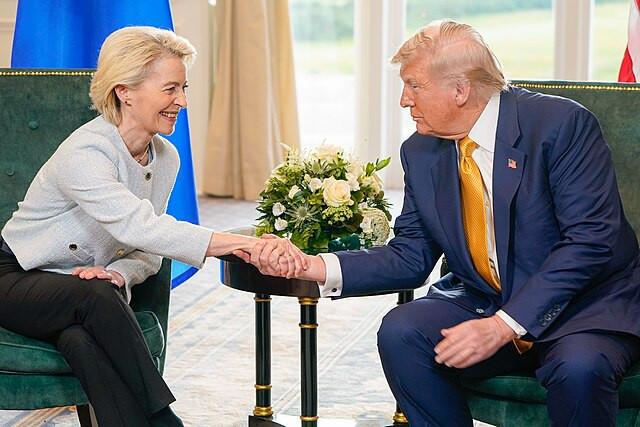The United States and the European Union announced a sweeping framework trade deal Sunday, averting a transatlantic tariff war by locking in a 15% across-the-board levy on EU imports. The pact follows weeks of high-stakes negotiations and comes just days before a threatened 30% tariff hike was set to take effect.
President Donald Trump and European Commission President Ursula von der Leyen unveiled the agreement after face-to-face talks at Trump's Turnberry golf resort in Scotland. "We are agreeing that the tariff straight across for automobiles and everything else will be a straight-across tariff of 15%," Trump said. "This is the biggest deal ever made."
The agreement includes $750 billion in European energy purchases from the U.S. and an additional $600 billion in EU investment in the American economy during Trump's second term. "All of the countries will be opened up to trade with the United States at zero tariffs, and they're agreeing to purchase a vast amount of military equipment," Trump added.
Von der Leyen, who described the talks as "very tough," said the deal brings "stability" and "predictability" for businesses. While European negotiators had hoped to retain the prior 10% baseline tariff or move to a zero-for-zero model, the final 15% rate was seen as preferable to the threatened 30% duties.
Not all EU leaders were satisfied. Bernd Lange, chair of the European Parliament's trade committee, said he was "quite critical," warning that the investment pledges may undercut European industry. Still, German Chancellor Friedrich Merz welcomed the agreement, noting it averted a trade conflict that would have hit Germany's export-driven economy and its large auto sector hard.
The framework follows a similar pattern to a recent U.S. deal with Japan, establishing a 15% uniform tariff on goods excluding steel and aluminum, which remain at 50%. Commerce Secretary Howard Lutnick said new semiconductor tariffs would be announced in two weeks and reiterated that "August 1, the tariffs are set. They'll go into place."
Pharmaceuticals and semiconductors will be subject to the 15% rate, according to von der Leyen, although aircraft, certain chemicals, and natural resources are exempt. Trump had earlier floated a 200% tariff on foreign-made pharmaceuticals but confirmed Sunday that those products are not included in the final deal. "Pharmaceuticals are very special. We can't be in a position where we're relying on other countries," he said.
The U.S. merchandise trade deficit with the EU reached $235 billion in 2024, fueling Trump's repeated claims that the bloc was "formed to screw the United States." In retaliation for potential tariffs, the EU had prepared countermeasures on $109 billion in U.S. goods and explored invoking its anti-coercion instrument to target American services.
The euro strengthened about 0.2% against the dollar, sterling, and yen following the announcement. Investors and policymakers alike viewed the deal as a reprieve from mounting transatlantic trade tensions.





